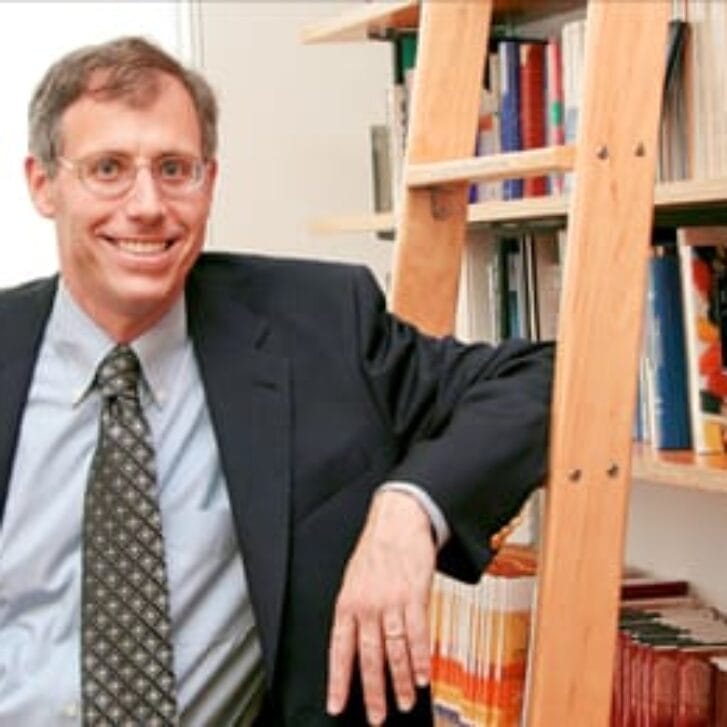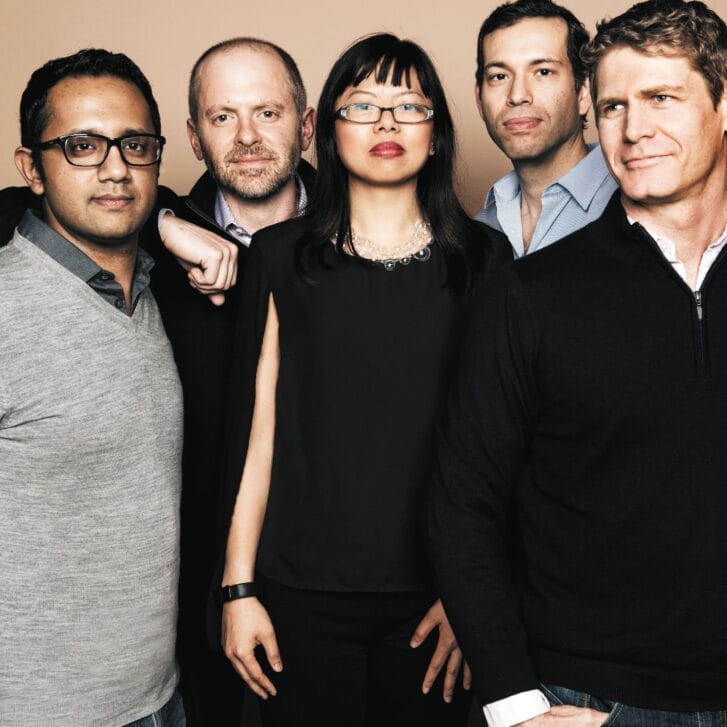The old adage goes: “It’s not what you know. It’s who you know.”
But in real life, the most successful people seem to have a combination of talent and networking know-how, intelligence, and connections.
Wharton alumni know this. Through the power of the Wharton network, they’ve helped each other get in business, stay in business … and stay sane while growing their businesses. They’ve
assisted each other with lateral moves, big leaps forward, and radical career changes.
“Whatever you’re looking for, you can get it through the Wharton network,” said Evan Betzer, WG’99, a member of the Wharton Alumni Association Board and past president of the Wharton Club of Houston, a club that has helped a number of members advance their careers through networking connections. “You can find a business partner or sell someone your company or make an acquisition. I’ve seen different types of networking, but if you have limited time, using the Wharton network should be at the top of your list.”
A Tipping Point
A chance encounter with a former classmate on a commuter train completely changed Serhan Secmen’s post-Wharton career path.
In May 2008, Secmen, WG’06, had just learned his job at Lehman Brothers was being eliminated. And he quickly realized that finding a similar position was going to be difficult. If not downright impossible. “There were no opportunities available,” says Secmen.
But then he ran into an old Wharton friend while commuting to New York City from his Westchester home. They talked about their families, their friends. Eventually talk turned to business.
“I told him my desk was closing and he immediately jumped at me and said, ‘This is great! I will definitely pass your name on to my supervisors. They’d be thrilled to talk to you,’” Secmen says.
That’s how Secmen’s resume ended up at Barclays—and how he ended up getting an offer from the firm a short time later. “Obviously, I’m not going to say they made the decision based solely on his input, but the reason I was given the opportunity was because of the Wharton network,” Secmen says.
His story doesn’t end there, though.
Secmen shared the news of his new position with his old friends at Lehman. But two of his mentors there, also Wharton grads, decided they didn’t want to see him go. They passed his name along to Citi Alternative Investments, a Lehman client, feeling that they’d rather have Secmen working with them than against them.
“I suddenly went from the position of being, ‘Where am I going to find a job?’ to having the opportunity to choose between three jobs,” Secmen said. “It was an extremely sweet spot for me—all because of a tipping point that was somehow linked to Wharton.”
For decision-making advice, Secmen turned again to one of those Lehman mentors. Rick Rieder, WG’87, was CEO of R3 Capital Properties and didn’t have a lot of spare time, but he agreed to meet with Secmen.”I explained all the options,” Secmen says. “He analyzed it with me and went over the personal stakes and advised me to go to Citi. And that’s how I made the decision.”
Secmen is now a Citi vice president. He’s confident he made the right decision.
“I couldn’t be happier,” he says.
A Lauder Connection
Nokia hasn’t traditionally participated in on-campus recruiting, but when Liz Schimel, Global Head of the company’s Music Services line, had an internship to fill, she looked to her alma mater first.
That’s how she found Brooke Eplee, G’09, WG’09. Both Schimel, C’81, G’81, G’87, WG’87, and Eplee are graduates of the Lauder Institute, a dual-degree institute within the Wharton that prepares students for a career in international business—the kind of preparation that is extremely compelling to an organization with Nokia’s level of global reach. “I would never have heard about this position without the Wharton network,” Eplee says.
Eplee notes that hers is a somewhat unusual path: She began her internship after graduation, at time when many classmates were either still looking for work or entering their first full-time jobs. Still, the Nokia internship was the right thing to do, she says, as jobs were scarce during the economic downturn. “It was a low-risk way for me to evaluate the opportunity and to get a foot in the door.” It paid off for Eplee, too. She started at Nokia in June and had a full time job offer by August.
Eplee now works for Nokia’s Music Group as global manager of growth, channel partnerships and integration. Her job involves frequent international travel and she says she’s found a perfect fit. She recommends others use their own network when seeking a job.
“It’s good to have someone on the inside to guide you,” Eplee says. “I’ve always had greatest success applying and learning about jobs through my professional network rather than through job postings, and Wharton’s network is as strong as they come.”
‘We Speak the Same Language’
Jesse Torres’ first two entrepreneurial ventures after Wharton were learning experiences—opportunities to test the waters of the business world and see his true capabilities.
He discovered that he’s capable of quite a bit.
Torres, W’00, currently serves as CEO for Debtmerica, a Santa Ana, CA-based debt-relief firm. His right-hand man, chief operating officer Harry Langenberg, W’00, is an old friend from Wharton. The two met during their freshman year.
Last year, Inc. magazine ranked Debtmerica among the nation’s 5,000 fastest-growing businesses. The Orange County Business Journal ranked the company No. 4 on its list of the “Best Places to Work in Orange County” and No. 3 in the category of “Fastest Growing Private Companies.”
While he says in some instances it’s beneficial to have a partner with a vastly different background, Torres says he and Langenberg’s shared Wharton experience has proven to be a plus.
“We speak the same language,” Torres said. “That provides an incredible platform to grow from.”
After graduation, Torres moved to the Bay Area and went to work at an investment bank. But after he found himself out of work twice within a year, the victim of a tanking tech market, he realized the hard way that there was no more security working for a large firm than there was working for himself. Langenberg, who’d also spent a year in the turbulent banking world, felt the same way. So the two decided to go into business together.
Their first venture was a commemorative medallion company. The company broke even after just nine months. Torres and Langenberg then moved to the Los Angeles area, where they established a mortgage company, and then launched Debtmerica in 2006.
The fast-growing company keeps the duo busy. But they say they still make time to check in at the local Wharton alumni club. Torres has found it a good place to share, learn and, of course, do business.
“I have a chance to meet people who are sometimes 20 or 30 years older than me, and they have a lot of experiences as operators, a lot of hands on,” he says. “They know the headaches I have to deal with today.
“You have to experience hardship, heartache and fault to improve upon it and not let it happen again. Just having a guy tell you, ‘Don’t do this, and don’t do that’ won’t help. The information they give when you can relate to the experiences they’ve had is exponentially greater.”
A Lucrative Lunch
Jim Noteware, WG’76, didn’t expect that a lunch meeting at his local Wharton alumni club would lead to more than hundreds of millions of dollars of investment capital.
But that’s exactly what happened.
In 2005, Noteware attended a “Deal Flow Lunch” organized by Steve Vosko, W’75, at the Wharton Club of Houston. The purpose of the monthly gathering, which is open to both Wharton grads and those from other highly regarded business schools, is simple: To share business plans, to make connections and to facilitate deals both big and small.
“What we do is start to eat and, then halfway through the entrée, we go around the tables and say, ‘Hi, here’s what I’ve done and here’s what I want to do,’” explains Noteware, a real estate developer. “We try to give short, executive summaries.”
At that particular lunch, Noteware found himself seated at the same table as a retired gentleman who had previously founded an investment banking firm. The man was impressed with Noteware’s presentation. “I want to introduce you to one of my younger partners,” the man said. “He builds his practice based on repeat business. He focuses on raising institutional equity.”
Five years later, Noteware has applied that single connection to raise more than $200 million in capital. He’s used the money to invest in properties up and down the West Coast and facilitate development deals everywhere from suburban Seattle to downtown Houston.
The banker Noteware met at the lunch remains one of his closest confidants and advisors.
“I don’t go to anyone else about raising finances unless I talk to him,” Noteware says. “Our one-hour lunch led to the beginning of a relationship that has blossomed beyond anyone’s original expectations.”
‘A Great Support’
A physician by training, Marketa Wills, M’00, WG’06, studied health care management while at Wharton. Then after graduation, she went to work for a consulting firm in Cleveland. She quickly realized the work didn’t suit her.
“I always knew,” Wills says, “that I wanted to be back in the hospital.”
In 2009, she moved to Houston. A short while later she met Abby Mitchell, WG’77. And no wonder: Mitchell, who served for years on Wharton’s health care programs alumni board, is an accomplished networker.
“I love helping people make connections,” she says. “I’ve been involved in so many search committees over the years that I know how to help others. And I have a special place in my heart for Wharton alumni.”
Mitchell gave Wills a few important names from her robust Rolodex. She also helped to prepare her for job interviews as Wills aimed to sell herself in area of health care administration.
“When we’d talk, I’d help her understand that she should not to underplay her skills and experience,” Mitchell says.
The training paid off. Not long after their meeting, Wills landed a job as Director of Physician Resources at Memorial Hermann Healthcare System.
“Without a doubt, the Wharton network was instrumental in helping me get settled professionally here in Houston, from making introductions to helping me tighten my story to individual coaching,” Wills says. “It continues to be a great support even now.”
A Fast-Growing Fast-Food Partnership
Charles Boyd and Alvin Rucker have a lot in common.
They’re both from the South. They both have parents who are educators. They even belonged to the same fraternity as undergrads.
But what finally brought these two business partners together was their tie to Wharton.
Boyd and Rucker met about six years ago at a Wharton Club of Houston meeting. Rucker, WG’87, had previously worked for Goldman Sachs and Enron and was considering a move into franchising. Boyd, WG’91, it turned out, had a friend interested in selling his stake in a health food chain.
That deal didn’t work out, but Boyd, who had previously worked in the tech industry, found himself intrigued by Rucker’s business plan. While some look down upon franchising, considering it “low-brow” business, Boyd said he and Rucker saw enormous potential—and profits.
They formed their company, Cardinal SW, four years ago. The firm takes its name after what the partners call the “cardinal principles” of running a successful restaurant: Cleanliness, courtesy and consistency.
When an opportunity to buy a handful of Popeyes restaurants arose, they jumped at it. To seal the deal, Boyd and Rucker secured an essential part of their financing from a company owned by yet another Wharton grad. They continue to rely on an informal network of other grads for advice as they have grown the business.
Cardinal SW now operates 21 Popeyes Louisana Kitchen restaurants in Texas, Georgia and North Carolina, and the partners say they’d like to eventually run between 150 and 200 locations.
They entered the fast food market at a trying time for the industry—labor, food and utility costs were all rising, causing downward pressure on profits. It was, Rucker says, a virtual “perfect storm” of negative factors. Still, the pair persevered, and say they now find themselves in an ideal position to grow.
“Anywhere you go in the country or even the world, you’ll find a Wharton graduate,” Rucker says. “It’s definitely had an impact on our careers.”
An Ongoing Commitment
When he decided to return to school and get his MBA, Wharton was an easy choice for Franck Noiret, WG’95. The French national, who had been working in London, knew all about the School, which enjoys a sterling reputation across the pond.
“Wharton is well-regarded in Europe and has an international reputation,” Noiret says. It also has an international network. So soon after Noiret moved back to Paris in 2000, he joined the city’s Wharton club.
That’s where he encountered Bertrand Schmitt, WG’04. The two met at the club and soon were working side by side, Noiret as club president and Schmitt as secretary general. In the process, Noiret came to know Schmitt very well. “I knew he was hard-working, trustworthy and he had a sense of mission,” he explains.
That’s why Noiret, a venture capitalist, hired Schmitt to work for one of his portfolio companies in the wireless sector. Schmitt started as a vice president in marketing. Within two years, he became the CEO and led the company until leaving for a new position in China. “It was a great story,” Noiret says.
Today, Noiret is still in Paris, where he continues to spearhead the Wharton club. Schmitt now works for a different firm in China.
And, of course, he’s involved with the Wharton club there.
A Tough Sell, Made Easier
Jim Sorensen, WG’78, was representing a unique player in the oil industry, a company by the name of Triad Pipe & Steel, and he figured buyers were going to be tough to find. After all, the company made “a very specialty type [of product], not just any pipe,” says Sorensen.
He was wrong.
During a conversation with the Houston Club’s Evan Betzer, Sorensen casually mentioned what he was working on. Betzer, it just so happened, knew another Wharton alumnus, Christopher Krummel, WG’03, who worked for the company, Enventure Global Technology (EGT), that purchased companies just like Triad. Betzer put the two men together and the rest is oil-field history.
EGT went ahead and purchased Triad, in so doing increasing its market presence in “a significant and meaningful way,” Krummel says.
“And because it was a private equity-backed company that was eventually sold, we realized a greater value for the sale,” Krummel says.
Sorensen, meanwhile, made his client happy with a smooth, successful and unexpectedly quick sale.
“It was very cooperative—the kind of thing you always wish for when you go to a professional business school,” Sorensen says. “It’s really neat: We’ve got all these Wharton grads. We’re spanning decades now, and we can all come together.”
The deal had one last Wharton connection. Betzer, a Principal with Stoneworth Financial, served as the buyer’s representative on the deal.
“It opened everybody’s eyes,” Betzer says, “to look within the club—and the network—first.”


























